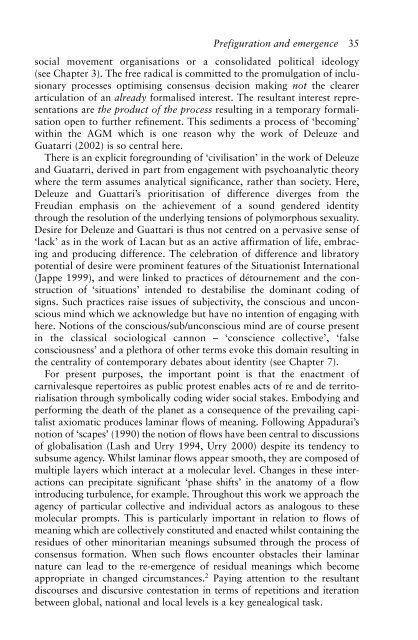Complexity and Social Movements: Multitudes at the Edge of Chaos ...
Complexity and Social Movements: Multitudes at the Edge of Chaos ...
Complexity and Social Movements: Multitudes at the Edge of Chaos ...
You also want an ePaper? Increase the reach of your titles
YUMPU automatically turns print PDFs into web optimized ePapers that Google loves.
Prefigur<strong>at</strong>ion <strong>and</strong> emergence 35<br />
social movement organis<strong>at</strong>ions or a consolid<strong>at</strong>ed political ideology<br />
(see Chapter 3). The free radical is committed to <strong>the</strong> promulg<strong>at</strong>ion <strong>of</strong> inclusionary<br />
processes optimising consensus decision making not <strong>the</strong> clearer<br />
articul<strong>at</strong>ion <strong>of</strong> an already formalised interest. The resultant interest represent<strong>at</strong>ions<br />
are <strong>the</strong> product <strong>of</strong> <strong>the</strong> process resulting in a temporary formalis<strong>at</strong>ion<br />
open to fur<strong>the</strong>r refinement. This sediments a process <strong>of</strong> ‘becoming’<br />
within <strong>the</strong> AGM which is one reason why <strong>the</strong> work <strong>of</strong> Deleuze <strong>and</strong><br />
Gu<strong>at</strong>arri (2002) is so central here.<br />
There is an explicit foregrounding <strong>of</strong> ‘civilis<strong>at</strong>ion’ in <strong>the</strong> work <strong>of</strong> Deleuze<br />
<strong>and</strong> Gu<strong>at</strong>arri, derived in part from engagement with psychoanalytic <strong>the</strong>ory<br />
where <strong>the</strong> term assumes analytical significance, r<strong>at</strong>her than society. Here,<br />
Deleuze <strong>and</strong> Gu<strong>at</strong>tari’s prioritis<strong>at</strong>ion <strong>of</strong> difference diverges from <strong>the</strong><br />
Freudian emphasis on <strong>the</strong> achievement <strong>of</strong> a sound gendered identity<br />
through <strong>the</strong> resolution <strong>of</strong> <strong>the</strong> underlying tensions <strong>of</strong> polymorphous sexuality.<br />
Desire for Deleuze <strong>and</strong> Gu<strong>at</strong>tari is thus not centred on a pervasive sense <strong>of</strong><br />
‘lack’ as in <strong>the</strong> work <strong>of</strong> Lacan but as an active affirm<strong>at</strong>ion <strong>of</strong> life, embracing<br />
<strong>and</strong> producing difference. The celebr<strong>at</strong>ion <strong>of</strong> difference <strong>and</strong> libr<strong>at</strong>ory<br />
potential <strong>of</strong> desire were prominent fe<strong>at</strong>ures <strong>of</strong> <strong>the</strong> Situ<strong>at</strong>ionist Intern<strong>at</strong>ional<br />
(Jappe 1999), <strong>and</strong> were linked to practices <strong>of</strong> détournement <strong>and</strong> <strong>the</strong> construction<br />
<strong>of</strong> ‘situ<strong>at</strong>ions’ intended to destabilise <strong>the</strong> dominant coding <strong>of</strong><br />
signs. Such practices raise issues <strong>of</strong> subjectivity, <strong>the</strong> conscious <strong>and</strong> unconscious<br />
mind which we acknowledge but have no intention <strong>of</strong> engaging with<br />
here. Notions <strong>of</strong> <strong>the</strong> conscious/sub/unconscious mind are <strong>of</strong> course present<br />
in <strong>the</strong> classical sociological cannon – ‘conscience collective’, ‘false<br />
consciousness’ <strong>and</strong> a plethora <strong>of</strong> o<strong>the</strong>r terms evoke this domain resulting in<br />
<strong>the</strong> centrality <strong>of</strong> contemporary deb<strong>at</strong>es about identity (see Chapter 7).<br />
For present purposes, <strong>the</strong> important point is th<strong>at</strong> <strong>the</strong> enactment <strong>of</strong><br />
carnivalesque repertoires as public protest enables acts <strong>of</strong> re <strong>and</strong> de territorialis<strong>at</strong>ion<br />
through symbolically coding wider social stakes. Embodying <strong>and</strong><br />
performing <strong>the</strong> de<strong>at</strong>h <strong>of</strong> <strong>the</strong> planet as a consequence <strong>of</strong> <strong>the</strong> prevailing capitalist<br />
axiom<strong>at</strong>ic produces laminar flows <strong>of</strong> meaning. Following Appadurai’s<br />
notion <strong>of</strong> ‘scapes’ (1990) <strong>the</strong> notion <strong>of</strong> flows have been central to discussions<br />
<strong>of</strong> globalis<strong>at</strong>ion (Lash <strong>and</strong> Urry 1994, Urry 2000) despite its tendency to<br />
subsume agency. Whilst laminar flows appear smooth, <strong>the</strong>y are composed <strong>of</strong><br />
multiple layers which interact <strong>at</strong> a molecular level. Changes in <strong>the</strong>se interactions<br />
can precipit<strong>at</strong>e significant ‘phase shifts’ in <strong>the</strong> an<strong>at</strong>omy <strong>of</strong> a flow<br />
introducing turbulence, for example. Throughout this work we approach <strong>the</strong><br />
agency <strong>of</strong> particular collective <strong>and</strong> individual actors as analogous to <strong>the</strong>se<br />
molecular prompts. This is particularly important in rel<strong>at</strong>ion to flows <strong>of</strong><br />
meaning which are collectively constituted <strong>and</strong> enacted whilst containing <strong>the</strong><br />
residues <strong>of</strong> o<strong>the</strong>r minoritarian meanings subsumed through <strong>the</strong> process <strong>of</strong><br />
consensus form<strong>at</strong>ion. When such flows encounter obstacles <strong>the</strong>ir laminar<br />
n<strong>at</strong>ure can lead to <strong>the</strong> re-emergence <strong>of</strong> residual meanings which become<br />
appropri<strong>at</strong>e in changed circumstances. 2 Paying <strong>at</strong>tention to <strong>the</strong> resultant<br />
discourses <strong>and</strong> discursive contest<strong>at</strong>ion in terms <strong>of</strong> repetitions <strong>and</strong> iter<strong>at</strong>ion<br />
between global, n<strong>at</strong>ional <strong>and</strong> local levels is a key genealogical task.




